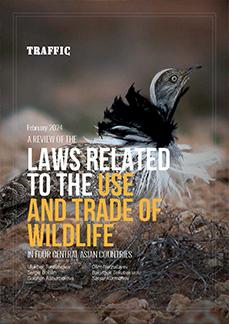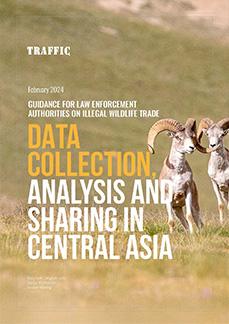
Fishermen in Viet Nam © CC Generic 2.0
i
our conservation work in Asia
Asian countries/territories continue to be major consumers of wildlife products. Current levels of consumption, if left unchecked, are threatening the continued survival in the wild of a wide variety of fauna and flora.
By co-operating with government departments, industry and civil society organisations, we are helping to bring about transformative change across both wildlife legislation and consumer attitudes.
Asia focus:
consumer behavioural change and enforcement support
national and international priorities
We have offices in six locations across Asia, each of which focus on national wildlife trade priorities, as well as wider transboundary issues.
Pangolin and tiger products, Asian songbirds, rhino horn and ivory are among the most commonly consumed wildlife products in Asia. Our ongoing market research, both online and physical, enables us to alert enforcement departments about illegal or unsustainable trade, whilst simultaneously co-operating with governments to embed wildlife protections into national and international legislation.
Social and Behavioural Change Communications initiatives are a growing priority in Asia, as working to change the motivations behind the consumption of endangered wildlife products is not only required by CITES parties, but has also seen measurable results amongst target audiences in recent years.
Priority countries/territories for our work in Asia
i
Contact us in Asia
Japan
+81 3 3769 1716
China
+86 10 6809 3666
Southeast Asia (Malaysia)
+603 7880 3940
Viet Nam
+84 24 3726 5023

TRAFFIC’s work in Asia is an essential component in the global fight against wildlife criminals and the move towards sustainable wildlife consumption
TP Singh, Senior Director – Asia Pacific
some areas of focus within wildlife trade in Asia
We have numerous priorities across Asia, explore the context to some of the most pressing issues below.
Although China’s domestic ivory market closure was a major achievement for TRAFFIC, WWF and other NGOs, there is much that remains to be done if the illegal ivory trade’s devastating influence on African Elephant populations is to be reversed. Monitoring illegal online and physical trade and supporting enforcement agencies across the world are two essential components of our ongoing work.
The development of new and existing sustainability frameworks for the harvesting and trade in timber and medicinal plants is another project focus. Through certification schemes such as the FairWild Standard we help to protect ecosystems from over-exploitation and ensure local communities and businesses harvest and trade in wildlife products in a sustainable, responsible and equitable way.
a selection of our conservation projects working in Asia
China's Champions of Change
China's Champions of Change is an EU-funded behavioural change project in China which concentrates on reducing the consumption of pangolin products and tropical timber.
China is a major consumer market for wildlife products. Pangolins are prized throughout wide consumer demographics for their perceived cultural, medicinal and social benefits, including for consumption as a delicacy or for use within Chinese Traditional Medicines.The overall objective of this project is to support China to reduce the demand for endangered species products, in particular pangolins and tropical timber.
Pangolins being processed for consumption at a pangolin plant in Africa
i
Combating wildlife cybercrime
Recent years have seen illegal wildlife trade steadily shifting towards online platforms. Illegal traders and smugglers are exploiting e-commerce websites, social media platforms and logistics companies to trade in wildlife contraband.
We're working to equip these sectors, as well as local law enforcement, with the necessary tools and knowledge to shut down the opportunities for their platforms to be exploited, as well as working to increase the detection and action taken against wildlife cybercriminals.
Wildlife forensics
Wildlife forensics is an increasingly important tool in the fight against wildlife crime.
Supporting and developing wildlife forensics capacity across Asia helps international enforcement agencies secure convictions against traffickers and better understand the source and species of seized wildlife products.
DNA testing on a seized rhino horn © TRACE Network
i
Asian Songbirds
Asian songbirds have reached crisis point.
Demand for wild-sourced Asian Songbirds across Southeast Asia has driven population declines and collapses across a wide variety of once-abundant species. We're working in partnership to monitor the trade and move consumption to sustainable levels.
Oriental White-eye Zosterops palpebrosus © Ali Arsh / CC Generic 2.0
i
latest reports related to ASIA
Asia is a major consumer and trader of wildlife products. Explore the latest publications relevant to the region here.
For the full TRAFFIC archive, visit our publications page.











